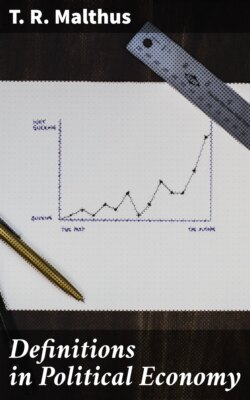Читать книгу Definitions in Political Economy - T. R. Malthus - Страница 8
На сайте Литреса книга снята с продажи.
Chapter IV.
APPLICATION OF THE TERM UTILITY BY M. SAY.
ОглавлениеTable of Contents
It would lead me too far and into too many repetitions, if I were to go through the principal definitions of the continental political economists, and examine the manner in which they have used their terms in reference to the obvious rules above laid down; but I cannot resist noticing one very signal deviation from them in the justly distinguished work of M. Say. It relates to the term utility.
It must be allowed by those who are acquainted with M. Say’s work, first, that he has used the term utility in a sense totally different from that in which it is used in common conversation, and in the language of those who are considered as the best authorities in political economy. Proceeding upon the principle, that nothing can be valuable which is not useful to some person or other, he has strangely identified utility and value, and made the utility of a commodity proportionate to its value, although the custom is universal of distinguishing between that which is useful and that which is merely high-priced, of that which is calculated to satisfy the acknowledged and general wants of mankind, and that which may be only calculated to satisfy the capricious tastes of a few. He has thus violated the first and most obvious rule for the use of terms.
Secondly, he has gone directly against the usage of the best writers in political economy, and particularly against the authority of Adam Smith, whom he himself considers as the main founder of the science. Adam Smith has declared his opinion in the most decided manner on this subject, by contrasting value in use, and value in exchange, and illustrating the distinction between them by adducing the marked instances of a diamond and water. M. Say, therefore, in the manner in which he has applied the term utility, has violated the second obvious rule for the use of terms, as well as the first.
Thirdly, the objections to the old terms in use, wealth and value, if there were any, do not by any means seem to have been such as to warrant the introduction of a new term. The object of M. Say seems to have been to show, that production does not mean production of new matter in the universe, but I cannot believe that even the Economists had this idea; and it is quite certain that Adam Smith’s definition of production completely excludes it. “There is one sort of labour,” he says, “which adds to the value of the subject on which it is bestowed*** and as it produces a value may be called productive.”[2] There is, certainly, no question here about the creation of new matter. And as M. Say observes, that when things are in their ordinary and natural state their value is the measure of their utility, while he had before affirmed that riches were in proportion to value,[3] it is difficult to conceive what beneficial purpose he could have in view in introducing the term utility thus made synonymous with value or riches.
Fourthly, as the terms useful and utility are in such very common use, when applied in their accustomed sense, and cannot easily be supplied by others, it is extremely difficult to confine their application to the new sense proposed by M. Say. It is scarcely possible not to use them sometimes, as M. Say himself has done, according to their ordinary acceptation; but this necessarily introduces uncertainty and obscurity into the language of political economy.
M. Say had before made little or no distinction between riches and value, two terms which Mr. Ricardo justly considers as essentially different. He then introduces another term, utility, which, as he applies it, can hardly be distinguished from either of the others. The new term, therefore, could not have been called for; and it must be allowed that the use of it in the sense proposed, violates all the most obvious rules for the introduction of a new term into any science.
